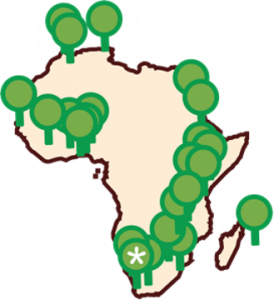H3Africa Informatics Network
H3ABioNet
The Goal: to develop bioinformatics capacity in Africa through training and support for data analysis, while also facilitating access to informatics infrastructure in the form of pipelines and tools for human, microbiome, and pathogen genomic data analysis.
Project Leads
The Problem
Researchers working in the life sciences are generating data of increasing size and complexity due to modern research techniques. Interpreting this data is essential for understanding health and disease and developing solutions to improve African and global health. Considering this and also the lack of modern research infrastructure in Africa, there is an ever-increasing need to develop the human and physical capacity for bioinformatic research in Africa to enable the interpretation of valuable African genomics data.
Project Strategy
- Implement a pan-African informatics infrastructure
- Develop an H3Africa Data Coordinating Center
- Provide high quality informatics support to H3Africa
- Enable and enhance innovative translational research
- Establish outreach and sustainability plans
Outcomes to Date
Training and Development
• 40 Courses/workshops run, 29 face-to face, 2,256 people trained
• Annual introductory and intermediate online courses
• New bioinformatics degree programs developed in 4 African countries
• 15 accreditations in analysis of genomic data awarded
Enabling Genomic Medicine in Africa
• Designed new genotyping chip for African populations
• African genome reference panel for imputation
• Genomic medicine curriculum designed and 225 nurses trained
• Clinical data collection and phenotype harmonization support
Computing Infrastructure
• 17 computing facilities developed across 11 countries
• 3432 cores for data processing
• 1.2 petabytes available for storage and processing of African genomic data
• 4 genomic data analysis workflows developed and openly accessible
Data Management, Structure, and Transfer
• 14 African genomics datasets (135TB) stored in H3Africa archive
• 13 datasets QC’d and submitted to pubic repositories
• Created the H3Africa Data Catalogue, which allows users to search for datasets and biospecimens of interest
• 77.3 terabytes of African genomic data transferred


